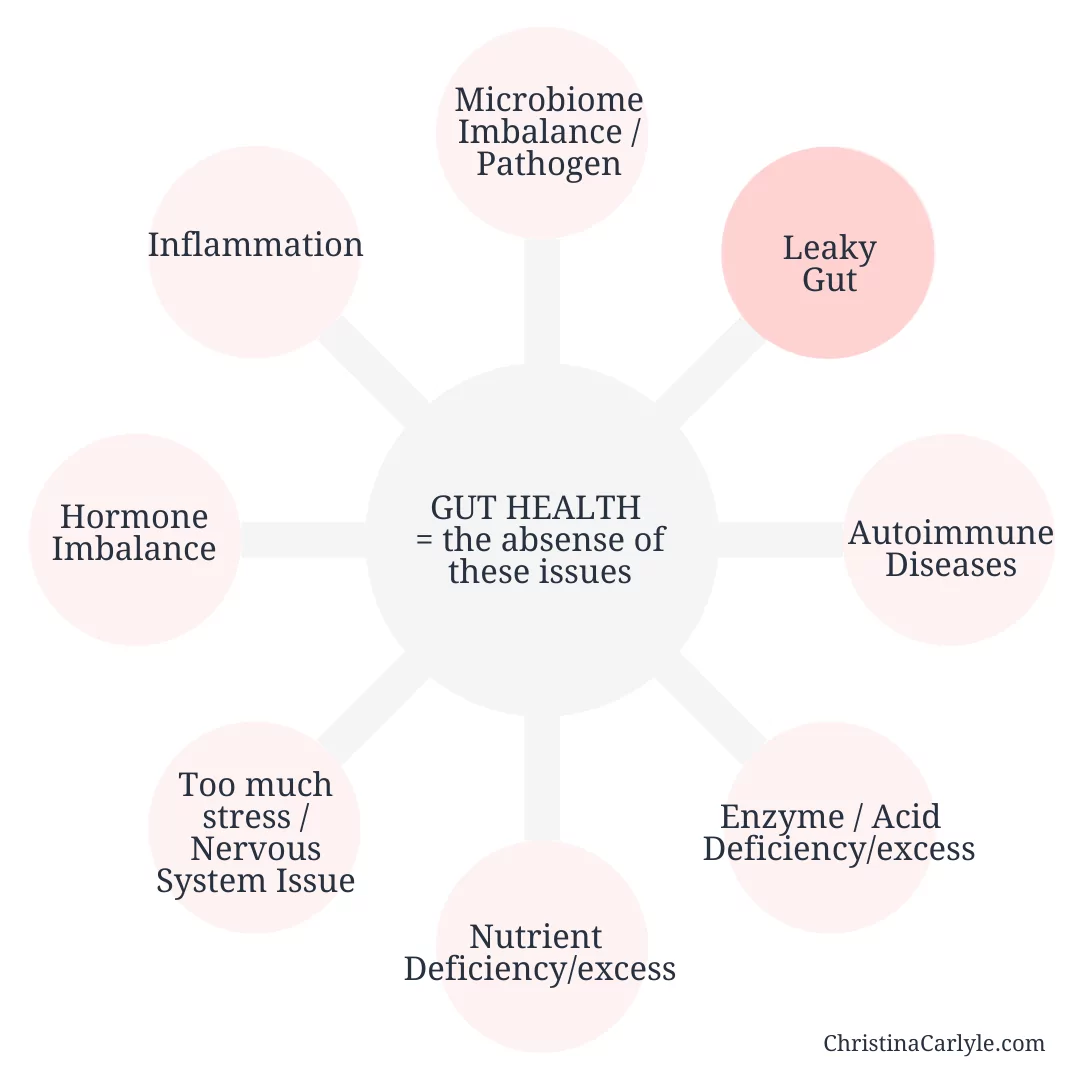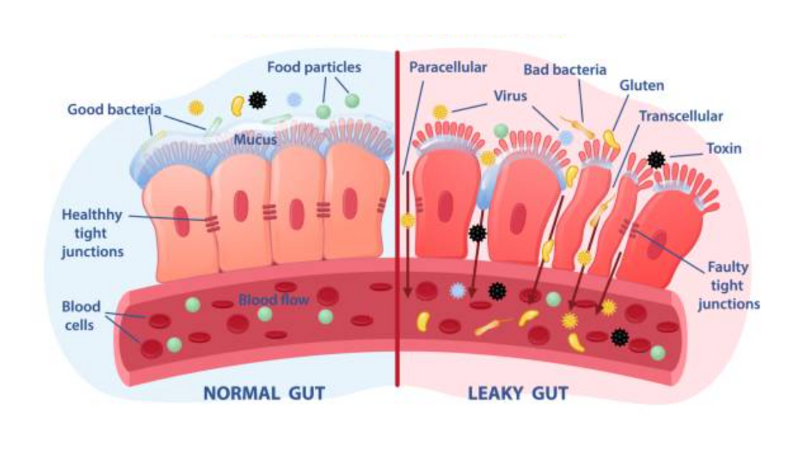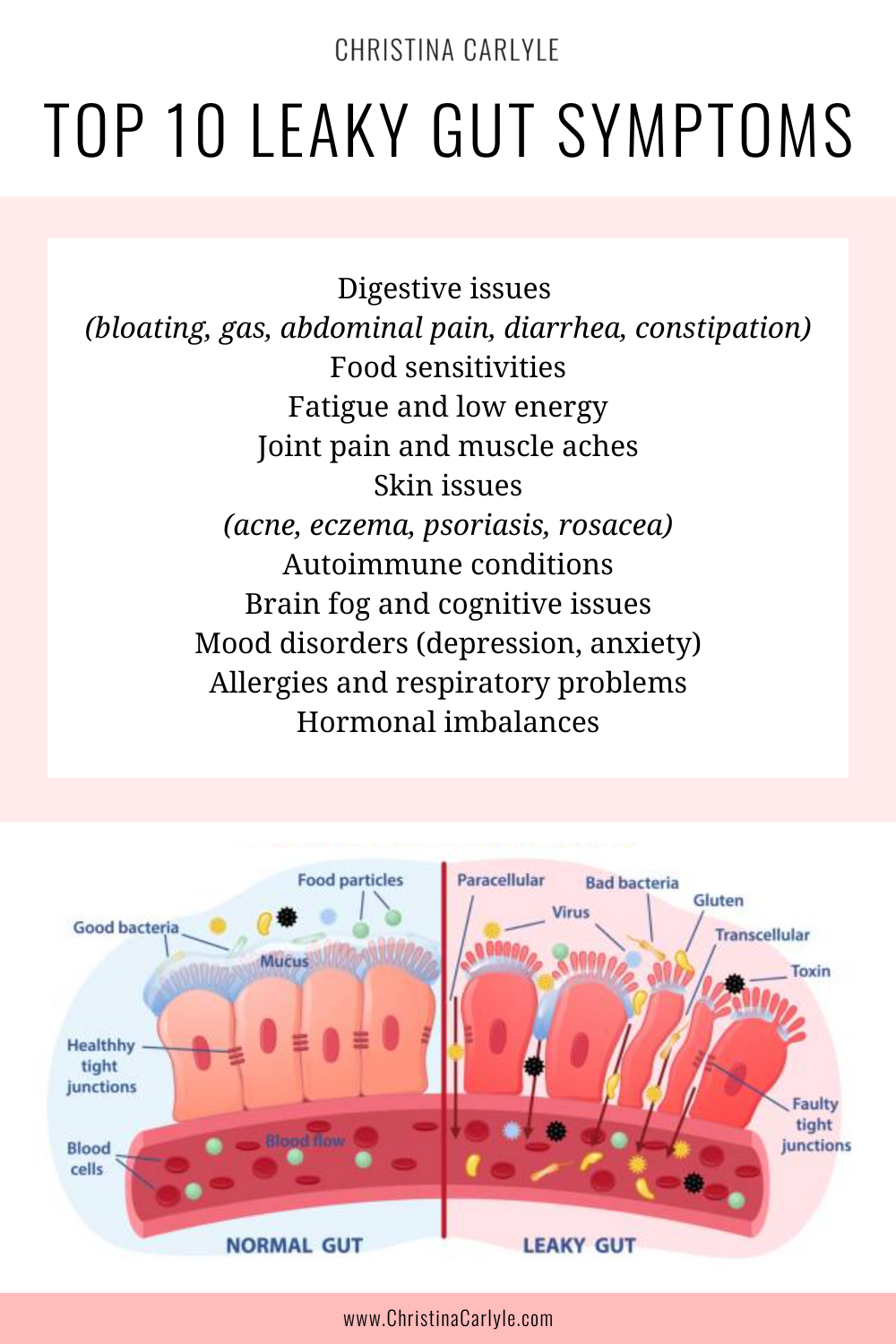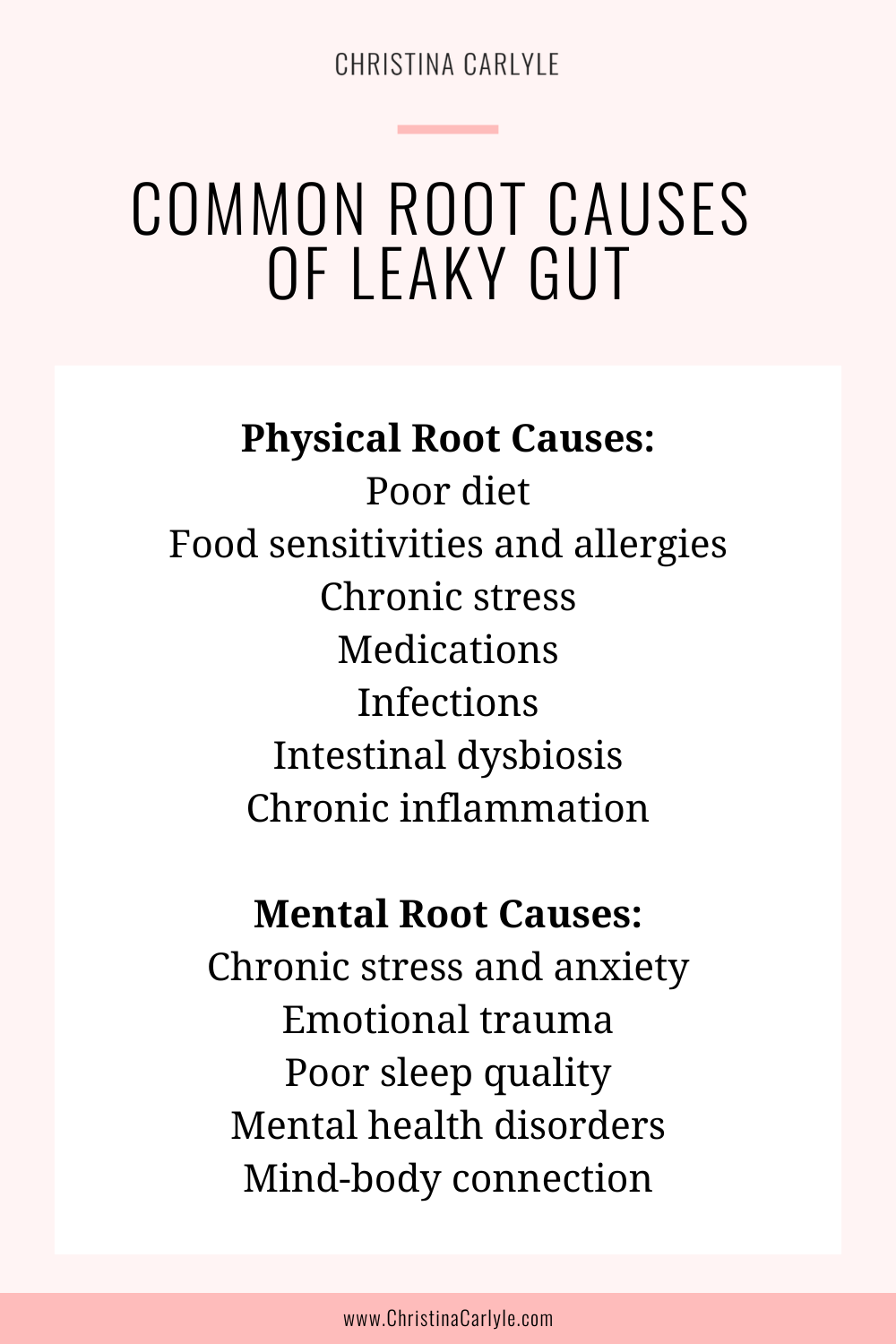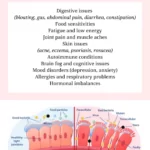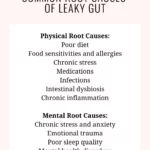Last Updated on June 22, 2023
If you have any GI issues, allergies, food sensitivities, skin issues, anxiety, and/or hormone issues there’s a huge chance you have leaky gut!
So many of my clients want to lose weight but also battle GI symptoms, inflammation, hormone (adrenal/thyroid) issues, and allergies/intolerances and have no idea that the root cause of their symptoms is actually leaky gut.
This is especially true if you have stubborn fat and cravings, and fatigue/mood swings, too. What’s even more frustrating is these leaky gut symptoms make it even harder to lose weight and get healthy.
If you’re stressed, eat processed foods, drink alcohol, take medication, and/or have other GI symptoms like bloating, gas, and irregularity there’s a huge chance your gut is leaking and you have other gut health issues!
But don’t worry! It’s possible to heal it and boost your gut health quickly so you can lose weight and feel your best. I’m going to explain everything you need to know about leaky gut and how to heal it.
You’ll learn:
- What leaky gut is?
- How leaky gut causes health and weight issues
- Symptoms of intestinal permeability
- What causes leaky gut?
- 5 easy steps that you can use to start healing your gut
Let’s dig in!
For starters, leaky gut is one of many issues that contribute to gut health.
Rest assured if you have leaky gut you have other gut health issues. Leaky gut is typically triggered after other gut health issues have been left untreated. Left untreated, symptoms compound and inflammation worsens which leads to leaky gut.
WHAT IS LEAKY GUT?
Leaky gut, also known as intestinal permeability, is a condition that refers to increased permeability or “leakiness” of the intestinal lining. The intestinal lining is made up of a single layer of cells that act as a barrier, controlling the absorption of nutrients and preventing harmful substances from entering the bloodstream.
In a healthy intestine, the lining allows only essential nutrients to pass through while keeping out bacteria, toxins, pathogens, and undigested food particles.
In the case of leaky gut, the integrity of the intestinal lining becomes compromised, and the tight junctions between the cells in the intestinal wall loosen. This allows substances that are normally restricted from entering the bloodstream to leak through the intestinal lining and gain access to the body’s circulation.
These substances can include bacteria, toxins, undigested food particles, and even larger molecules like proteins.
When these foreign substances enter the bloodstream, they can trigger an immune response and cause inflammation throughout the body.
This chronic inflammation is believed to be associated with a variety of health issues, including digestive disorders, autoimmune diseases, food sensitivities, allergies, skin conditions, and even mental health problems.
How Intestinal Permeability Causes Health & Weight Issues
Leaky gut causes pesky symptoms but left untreated, symptoms can turn into a health or metabolic issue(s).
Leaky gut is a problematic condition that should be taken seriously because it tends to have a negative domino effect and can cause other more serious issues that affect health and weight like:
- Impaired Nutrient Absorption: The lining of the intestines is responsible for absorbing nutrients from food. When the intestinal barrier becomes compromised, larger molecules, including undigested food particles and toxins, can leak into the bloodstream instead of being properly broken down and absorbed. This can lead to malabsorption of essential nutrients, potentially resulting in nutrient deficiencies weekend immunity and a slow metabolism.
- Inflammation: The leakage of substances through the compromised gut barrier triggers an immune response, leading to inflammation. The immune system recognizes the leaked particles as foreign invaders and mounts an inflammatory reaction. Chronic inflammation can damage the intestinal lining and contribute to a variety of gut-related conditions, such as inflammatory bowel disease (IBD), aches, joint & muscle pain, and weight gain.
- Immune System Dysfunction: The gut plays a crucial role in immune system function, housing a large portion of immune cells. When the gut barrier is compromised, the immune system can become dysregulated. It may overreact to harmless substances, leading to allergies or sensitivities, or it may underreact, making the body more susceptible to infections and metabolic disorders.
- Gut Microbiota Imbalance: The gut microbiota, the collection of microorganisms residing in the intestines, plays a crucial role in maintaining gut health. A leaky gut can disrupt the balance of the gut microbiota, favoring the growth of harmful bacteria and reducing the presence of beneficial bacteria. This imbalance, known as dysbiosis, can further contribute to inflammation and gut-related disorders and weight gain.
- Systemic Effects: Leaky gut can have systemic effects beyond the gut. When toxins, undigested food particles, and other molecules leak into the bloodstream, they can travel to other parts of the body, potentially triggering immune responses and inflammation in distant organs or tissues. This can contribute to a range of symptoms, including fatigue, joint pain, skin issues, allergies, and autoimmune conditions. Adrenal, thyroid, and reproductive issues are common as leaky gut progresses.
Compared to other gut health issues, leaky gut is more severe in terms of symptoms and damage it can cause in the body.
Leaky gut has to be addressed to be able to begin healing the gut.
You can’t fix a leaky gut with probiotics either… in fact, taking prebiotics while a leaky gut is present can cause the probiotics to leak into the bloodstream and make symptoms worse.
Do you have leaky gut? Let’s see if you have any of the symptoms.
Intestinal Permeability Symptoms
Leaky gut (intestinal permeability) can manifest with various symptoms, although it’s important to note that these symptoms are not specific to leaky gut alone and can be present in other health conditions as well.
Here are 10 most common symptoms:
- Digestive issues: Leaky gut can lead to a range of digestive problems, including bloating, gas, abdominal pain or cramps, diarrhea, and constipation. These symptoms may occur due to the compromised gut barrier and inflammation in the digestive tract.
- Food sensitivities: Leaky gut can trigger immune responses to undigested food particles that leak into the bloodstream, leading to food sensitivities or intolerances. Individuals may develop reactions to certain foods, experiencing symptoms such as headaches, skin rashes, joint pain, or fatigue after consuming those foods.
- Fatigue and low energy: Chronic inflammation and nutrient malabsorption associated with leaky gut can contribute to fatigue and a general feeling of low energy.
- Joint pain and muscle aches: Inflammatory processes in the gut can trigger systemic inflammation, leading to joint pain and muscle aches. This can resemble symptoms of conditions like arthritis.
- Skin issues: Leaky gut has been linked to certain skin conditions, including acne, eczema, psoriasis, or rosacea. The connection between the gut and skin health is believed to be influenced by inflammation and immune responses.
- Autoimmune conditions: Leaky gut may contribute to the development or exacerbation of autoimmune diseases. The compromised gut barrier can allow the passage of undigested proteins, triggering immune reactions and potentially leading to autoimmune responses against the body’s own tissues.
- Brain fog and cognitive issues: Some individuals with leaky gut may experience difficulties with focus, memory, or mental clarity. This “brain fog” may be attributed to the systemic inflammation and potential impact on neurotransmitter function. Leaky gut and leaky brain go hand in hand.
- Mood disorders: Leaky gut has been associated with mood disorders such as depression and anxiety. The gut-brain axis, which involves bidirectional communication between the gut and the brain, can be affected by gut health disturbances.
- Allergies and respiratory problems: Chronic inflammation in the gut can contribute to increased susceptibility to allergies and respiratory issues like asthma or sinusitis.
- Hormonal imbalances: Leaky gut can disrupt hormone balance, potentially leading to irregular menstrual cycles, PMS symptoms, or hormonal issues in both men and women.
If you have any of these symptoms I highly recommend you start taking steps to address your gut health in order to prevent issues from progressing.
In order to heal leaky gut you need to stop all causes of it.
Lack of exercise can also contribute to leaky gut, too!
What causes Leaky Gut?
The exact causes of leaky gut are not entirely understood, but there are certain physical and mental factors known to contribute to its development.
They are…
Physical Root Causes:
- Poor diet: Consuming a diet high in processed foods, refined sugars, unhealthy fats, and lacking in nutrients can contribute to gut inflammation and compromise the integrity of the gut lining.
- Food sensitivities and allergies: Certain foods, such as gluten, dairy, and soy, can trigger an immune response in some individuals, leading to gut inflammation and increased intestinal permeability.
- Chronic stress: Prolonged stress can disrupt the balance of gut bacteria, impair digestion, and weaken the gut lining.
- Medications: Long-term use of non-steroidal anti-inflammatory drugs (NSAIDs), antibiotics, and certain medications can disrupt the gut microbiota and contribute to leaky gut.
- Infections: Gut infections caused by parasites, bacteria, or viruses can damage the gut lining and increase permeability.
- Intestinal dysbiosis: An imbalance in the gut microbiota, with an overgrowth of harmful bacteria and a decrease in beneficial bacteria, can contribute to gut inflammation and leaky gut.
- Chronic inflammation: Conditions such as inflammatory bowel disease (IBD), Crohn’s disease, and celiac disease can cause chronic inflammation in the gut and compromise the gut barrier function.
Mental Root Causes:
- Chronic stress and anxiety: Psychological stress and anxiety can disrupt gut function, alter gut motility, and contribute to gut inflammation and increased intestinal permeability.
- Emotional trauma: Past traumas or chronic emotional stress can impact gut health by affecting the gut-brain axis, leading to gut dysfunction and increased susceptibility to leaky gut.
- Poor sleep quality: Inadequate sleep or disrupted sleep patterns can negatively impact gut health and contribute to gut inflammation.
- Mental health disorders: Conditions like depression, anxiety disorders, and eating disorders are associated with gut dysfunction and may contribute to leaky gut.
- Mind-body connection: The bidirectional communication between the brain and the gut, known as the gut-brain axis, can be disrupted by mental health issues, leading to gut disturbances and leaky gut symptoms.
Leaky gut doesn’t happen instantly but rather over a period of time.
While leaky gut is not a recognized medical diagnosis in conventional medicine, holistic, alternative, and functional practitioners know it plays a role in various health conditions.
TIPS TO REVERSE LEAKY GUT
Here’s a simple protocol to help reverse leaky gut, that boosts gut health and metabolism so you can reverse symptoms and lose weight:
- Cut out all inflammatory sources of foods, drinks, supplements, and consumables & eat a diet that promotes gut health and healing. You can’t heal the gut simply by eating healthy… you have to avoid the wrong things and eat the right things to heal the gut and reverse inflammation, microbiome, hormone, toxicity, metabolic, and nutrient absorption issues. That’s what my Total Transformation Program does and why it works so well (& quickly!)
- Heal and balance your gut with these Gut Health Supplements.
- Eat high Probiotic and Prebiotic foods with every meal. (at least one serving of both pre/pro per meal.)
- Eat Gut Healing Foods. These have the nutrients, fibers, and plant chemicals needed to heal and balance all aspects of the gut. Eat 1-2 servings of these Gut Healing Foods with every meal.
- Engage in a healthy lifestyle & other healthy habits that support gut health and metabolism (like stress management, hydration, exercise, supplementation, etc. – all of which are covered in my Total Transformation Program.)
- Radically reduce stressors in your life and use healthy coping skills.
- When you combine the right diet + healing protocols & supplements you’ll get results you can see and feel a LOT faster.
If you really want to clean up your diet, heal your gut, reverse inflammation, balance hormones, and get rid of fatigue and cravings – AND lose weight – you need my Total Transformation Program.

4 week before and afters using my Total Transformation Program
Remember, if you have gut health symptoms you most likely also have metabolic dysfunction. This free training explains more about metabolic dysfunction & how I fix it so you can lose weight & feel great ASAP.
I hope this helped you!
Your Coach & Biggest Cheerleader,
![]()

MORE GUT HEALTH & WEIGHT LOSS INFO
Check out these related articles to fill in more of the “gut health puzzle” so you’ll understand more about the different aspects of gut health, how they cause symptoms & weight gain, and how to optimize your gut health to maximize your weight loss potential:
- Gut Health and Weight Loss
- What are Probiotics?
- Probiotics and Weight Loss
- What are Prebiotics?
- The Best Foods for Gut Health
- What is Leaky Gut?
- Gut Health Supplements
- Intestinal Inflammation
- Gut Microbiome


